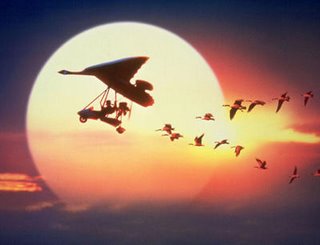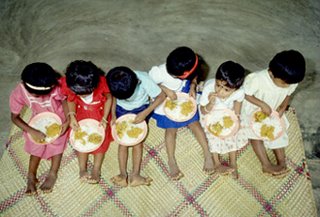Who Will Fly the Birds to Freedom?
By Otto Spijkers
 In the movie Fly Away Home, a young girl mothers a group of geese; when it’s time for the birds to escape the cold Canadian winter and fly to California, she even escorts them there, using a small airplane (see picture on the left). The geese have names, like Featherbrain and Igor (first she calls the goose Limpy, because it can’t fly, but the name is later changed to Igor in order to avoid a psychological complex). The geese get individual names, because the girl believes they all have different personalities.
In the movie Fly Away Home, a young girl mothers a group of geese; when it’s time for the birds to escape the cold Canadian winter and fly to California, she even escorts them there, using a small airplane (see picture on the left). The geese have names, like Featherbrain and Igor (first she calls the goose Limpy, because it can’t fly, but the name is later changed to Igor in order to avoid a psychological complex). The geese get individual names, because the girl believes they all have different personalities.
That is promising, but do these birds also have legal personality? To be a legal person, with rights and duties, is not something that comes natural. The term natural rights is misleading, because many persons had to struggle in order to get their personality, and ensuing rights. Some humans only recently acquired their natural human rights. And now it is time for the animals. But they have a difficulty none of the suppressed humans had: the animals do not speak the language of the one power that hands out legal personality, and legal rights: man.
 Fortunately, some men act as the animal’s advocates, chief amongst them is probably Peter Singer. His book Animal Liberation: A New Ethics for Our Treatment of Animals, is a classic. And there's more: Since 2000, Harvard Law School has a course on Animal Rights. Moreover, there are many animal rights’ initiatives on the internet: the Great Ape Project, which aims (as a first step?) to establish a Declaration on Great Apes, inspired by the UN Universal Declaration of Human Rights. (And yes: there's also an anti-animal rights website.) But most important of all: in the Netherlands we have a new political party participating in the upcoming elections: the Partij voor de Dieren (Party for the Animals) aiming to represent the interests of the animals in Parliament.
Fortunately, some men act as the animal’s advocates, chief amongst them is probably Peter Singer. His book Animal Liberation: A New Ethics for Our Treatment of Animals, is a classic. And there's more: Since 2000, Harvard Law School has a course on Animal Rights. Moreover, there are many animal rights’ initiatives on the internet: the Great Ape Project, which aims (as a first step?) to establish a Declaration on Great Apes, inspired by the UN Universal Declaration of Human Rights. (And yes: there's also an anti-animal rights website.) But most important of all: in the Netherlands we have a new political party participating in the upcoming elections: the Partij voor de Dieren (Party for the Animals) aiming to represent the interests of the animals in Parliament.
When the personality of animals is recognized, that doesn’t necessarily mean we can no longer eat them (after all: they do eat eachother too), or use their fur for winter coats. What it means is that the following will be deemed fundamentally mistaken: to consider - and treat! - animals solely as products, property, or as resources for human purposes.
 The website of Stork Food Systems, a Dutch company, is a good example of the way animals are looked at, and treated. On Stork’s website, you can find many machines designed to efficiently kill, defeather, cut up and debone poultry - admittedly, there’s a stunning device too (see picture, and see website ). The “precise slit” of the Killer KS-10, one of Stork’s machines, is heralded: “Inside the killer the knife can apply a perfect slit at the side of the neck thanks to a precise way of positioning the head. The artery and veins are opened while the trachea and gullet remain entirely intact which ensures optimum functioning of the head/trachea puller.” There’s a documentary, “Our Daily Bread”, I have seen only parts of it myself, that shows how our food – read: animals - is processed.
The website of Stork Food Systems, a Dutch company, is a good example of the way animals are looked at, and treated. On Stork’s website, you can find many machines designed to efficiently kill, defeather, cut up and debone poultry - admittedly, there’s a stunning device too (see picture, and see website ). The “precise slit” of the Killer KS-10, one of Stork’s machines, is heralded: “Inside the killer the knife can apply a perfect slit at the side of the neck thanks to a precise way of positioning the head. The artery and veins are opened while the trachea and gullet remain entirely intact which ensures optimum functioning of the head/trachea puller.” There’s a documentary, “Our Daily Bread”, I have seen only parts of it myself, that shows how our food – read: animals - is processed.
What does an animal need to do in order to avoid being treated as a product? Well, it has to have its personality established, both morally and legally. It needs help from lawyers and philosophers to counter the familair arguments: the argument that animals do not deserve rights because they do not respect the rights of others; or the argument that (some) animals have no soul, no ratio, or no capability to experience pain. Perhaps even more importantly, the animal needs the help of children's books, Hollywood movies (like Fly Away Home), and documentaries (like Our Daily Bread), to create awareness and change the common perception.
Much is at stake. To possess personality is life-saving. However, there may be other ways for an animal to prevent being eaten. The following dialogue suggests that being filthy may do an animal just as much good as having personality:
Vincent: “Want some bacon?”
Jules: “No man, I don’t eat pork.”
Vincent: “Are you Jewish?”
Jules: “No, I ain’t Jewish, I just don’t dig on swine, that’s all.”
Vincent: “Why not?”
Jules: “Pigs are filthy animals. I don’t eat filthy animals.”
Vincent: “Yeah, but bacon tastes good; pork chops taste good.”
Jules: “Sewer rat may taste like pumpkin pie, but I’d never know, because I’d never eat the filthy motherfucker. Pigs sleep and root in shit, that’s a filthy animal. I don't wanna eat nothin' that ain't got enough sense to disregard its own faeces.”
Vincent: “How about a dog? A dog eats its own faeces?”
Jules: “I don’t eat dog either.”
Vincent: “Yeah, but do you consider a dog to be a filthy animal?”
Jules: “I wouldn’t go so far as to call a dog filthy, but they’re definitely dirty. But, a dog’s got personality. And personality goes a long way.”
Vincent: “Ah, so by that rationale, if a pig had a better personality, it ceased to be a filthy animal? Is that true?”
Jules: “Well, we had to be talking about one charming motherfucking pig!”
 In the movie Fly Away Home, a young girl mothers a group of geese; when it’s time for the birds to escape the cold Canadian winter and fly to California, she even escorts them there, using a small airplane (see picture on the left). The geese have names, like Featherbrain and Igor (first she calls the goose Limpy, because it can’t fly, but the name is later changed to Igor in order to avoid a psychological complex). The geese get individual names, because the girl believes they all have different personalities.
In the movie Fly Away Home, a young girl mothers a group of geese; when it’s time for the birds to escape the cold Canadian winter and fly to California, she even escorts them there, using a small airplane (see picture on the left). The geese have names, like Featherbrain and Igor (first she calls the goose Limpy, because it can’t fly, but the name is later changed to Igor in order to avoid a psychological complex). The geese get individual names, because the girl believes they all have different personalities.That is promising, but do these birds also have legal personality? To be a legal person, with rights and duties, is not something that comes natural. The term natural rights is misleading, because many persons had to struggle in order to get their personality, and ensuing rights. Some humans only recently acquired their natural human rights. And now it is time for the animals. But they have a difficulty none of the suppressed humans had: the animals do not speak the language of the one power that hands out legal personality, and legal rights: man.
 Fortunately, some men act as the animal’s advocates, chief amongst them is probably Peter Singer. His book Animal Liberation: A New Ethics for Our Treatment of Animals, is a classic. And there's more: Since 2000, Harvard Law School has a course on Animal Rights. Moreover, there are many animal rights’ initiatives on the internet: the Great Ape Project, which aims (as a first step?) to establish a Declaration on Great Apes, inspired by the UN Universal Declaration of Human Rights. (And yes: there's also an anti-animal rights website.) But most important of all: in the Netherlands we have a new political party participating in the upcoming elections: the Partij voor de Dieren (Party for the Animals) aiming to represent the interests of the animals in Parliament.
Fortunately, some men act as the animal’s advocates, chief amongst them is probably Peter Singer. His book Animal Liberation: A New Ethics for Our Treatment of Animals, is a classic. And there's more: Since 2000, Harvard Law School has a course on Animal Rights. Moreover, there are many animal rights’ initiatives on the internet: the Great Ape Project, which aims (as a first step?) to establish a Declaration on Great Apes, inspired by the UN Universal Declaration of Human Rights. (And yes: there's also an anti-animal rights website.) But most important of all: in the Netherlands we have a new political party participating in the upcoming elections: the Partij voor de Dieren (Party for the Animals) aiming to represent the interests of the animals in Parliament. When the personality of animals is recognized, that doesn’t necessarily mean we can no longer eat them (after all: they do eat eachother too), or use their fur for winter coats. What it means is that the following will be deemed fundamentally mistaken: to consider - and treat! - animals solely as products, property, or as resources for human purposes.
 The website of Stork Food Systems, a Dutch company, is a good example of the way animals are looked at, and treated. On Stork’s website, you can find many machines designed to efficiently kill, defeather, cut up and debone poultry - admittedly, there’s a stunning device too (see picture, and see website ). The “precise slit” of the Killer KS-10, one of Stork’s machines, is heralded: “Inside the killer the knife can apply a perfect slit at the side of the neck thanks to a precise way of positioning the head. The artery and veins are opened while the trachea and gullet remain entirely intact which ensures optimum functioning of the head/trachea puller.” There’s a documentary, “Our Daily Bread”, I have seen only parts of it myself, that shows how our food – read: animals - is processed.
The website of Stork Food Systems, a Dutch company, is a good example of the way animals are looked at, and treated. On Stork’s website, you can find many machines designed to efficiently kill, defeather, cut up and debone poultry - admittedly, there’s a stunning device too (see picture, and see website ). The “precise slit” of the Killer KS-10, one of Stork’s machines, is heralded: “Inside the killer the knife can apply a perfect slit at the side of the neck thanks to a precise way of positioning the head. The artery and veins are opened while the trachea and gullet remain entirely intact which ensures optimum functioning of the head/trachea puller.” There’s a documentary, “Our Daily Bread”, I have seen only parts of it myself, that shows how our food – read: animals - is processed.What does an animal need to do in order to avoid being treated as a product? Well, it has to have its personality established, both morally and legally. It needs help from lawyers and philosophers to counter the familair arguments: the argument that animals do not deserve rights because they do not respect the rights of others; or the argument that (some) animals have no soul, no ratio, or no capability to experience pain. Perhaps even more importantly, the animal needs the help of children's books, Hollywood movies (like Fly Away Home), and documentaries (like Our Daily Bread), to create awareness and change the common perception.
Much is at stake. To possess personality is life-saving. However, there may be other ways for an animal to prevent being eaten. The following dialogue suggests that being filthy may do an animal just as much good as having personality:
Vincent: “Want some bacon?”
Jules: “No man, I don’t eat pork.”
Vincent: “Are you Jewish?”
Jules: “No, I ain’t Jewish, I just don’t dig on swine, that’s all.”
Vincent: “Why not?”
Jules: “Pigs are filthy animals. I don’t eat filthy animals.”
Vincent: “Yeah, but bacon tastes good; pork chops taste good.”
Jules: “Sewer rat may taste like pumpkin pie, but I’d never know, because I’d never eat the filthy motherfucker. Pigs sleep and root in shit, that’s a filthy animal. I don't wanna eat nothin' that ain't got enough sense to disregard its own faeces.”
Vincent: “How about a dog? A dog eats its own faeces?”
Jules: “I don’t eat dog either.”
Vincent: “Yeah, but do you consider a dog to be a filthy animal?”
Jules: “I wouldn’t go so far as to call a dog filthy, but they’re definitely dirty. But, a dog’s got personality. And personality goes a long way.”
Vincent: “Ah, so by that rationale, if a pig had a better personality, it ceased to be a filthy animal? Is that true?”
Jules: “Well, we had to be talking about one charming motherfucking pig!”
Pictures are from Fly Away Home, the Great Ape Project, Stork Food Systems, and Pulp Fiction (the dialogue is also from that movie).







